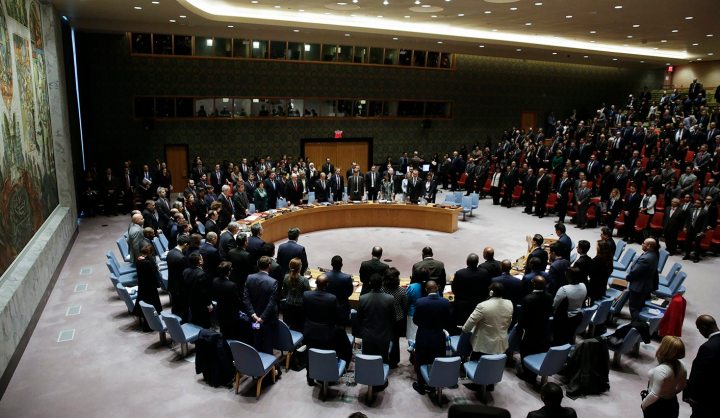ISS TODAY
SA ends its first big act on the UN Security Council

South Africa’s mixed performance as council president in October shows how much work is still needed. By Gustavo de Carvalho and Priyal Singh
First published by ISS Today
By 31 October, South Africa will have completed the first of its two presidency months as an elected member of the United Nations Security Council (UNSC) for 2019-20. Its second presidency month is in December 2020. The country’s October presidency was expected to be South Africa’s main stage during its first year on the council.
This month the country showed its ability to lead on a number of African issues, for example, South Sudan. However, there was also controversy regarding its approaches towards some issues, such as financing African Union (AU)-led peace operations, and the women, peace and security agenda.
Security Council members usually use their presidency months to bolster their visibility and affirm their foreign policy priorities through choosing discretionary events as part of the council’s monthly agenda. They also chair all meetings that take place in the council chamber.
When South Africa was elected to the council in 2018, it said its council priorities would relate mostly to African country files, such as South Sudan and the Democratic Republic of the Congo (DRC). It also said it would focus on themes such as the UN-AU partnership for peace and security (including Silencing the Guns by 2020); the women, peace and security agenda; and the role of mediation in conflict prevention.
Numerous analysts in New York and South Africa told the Institute for Security Studies (ISS) that the country could have articulated its priorities more clearly over the past 10 months. South Africa’s stated priorities didn’t always materialise through the country’s interventions on the council, and its broader diplomatic efforts in New York.
Preparations for the October presidency certainly helped South Africa further advance the countries and issues it was willing to pursue. On the second day of its presidency, the council hosted a debate on mobilising youth towards Silencing the Guns by 2020. South Africa scored some points by linking this issue to its strategic priority of strengthening the Silencing the Guns agenda item.
Being the month’s president and one of the three African members of the UN Security Council (the A3), South Africa led the council delegation to the 13th Annual Joint Consultative Meeting with the AU Peace and Security Council (PSC) in Addis Ababa on 22 October. The meeting was preceded by a UN Security Council visit to South Sudan, co-led by South Africa and the United States (US).
During the meeting, South Africa continued playing the role, as it does in New York, of attempting to bring cohesion between the A3, the PSC and broader AU common positions. Considering that South Africa will in 2020 also be AU chair, this visit gave the country the opportunity to experience some of the dynamics it will have to deal with as a bridge-builder.
South Africa still has much work to do regarding UNSC-PSC collaboration after the visit to Addis. In a recent report by the ISS and the International Peace Institute, it was argued that UNSC-PSC meetings are often challenged by outcome documents that are weak or lack actionable decisions that can be followed up.
There is also a risk that this year’s communiqué may not be approved as quickly as it was in 2018, and South Africa will need to prioritise these issues over the coming weeks.
October also had some controversies. In the build-up to its presidency, in late August South Africa shared with the PSC a draft resolution on the financing of AU-led peace operations by UN-assessed contributions. Despite the reluctance of the US to engage with the matter, South Africa tried to show AU member states that it was still willing to advance this critical issue.
However, the PSC opposed the draft, calling for a common position to be formulated at the next Ordinary Session of the AU before a revised draft could be presented to the council by the A3.
More controversial have been the discussions on women, peace and security. The annual council open debate on the issue is typically held in October after the release of the UN Secretary-General’s annual report on the subject. Next year marks the 20th anniversary of UNSC Resolution 1325, which placed the issue on the council’s agenda. South Africa has been building its position to use October as the month that can set the tone for discussions in 2020.
With the planned resolution on financing AU peace operations no longer possible, women, peace and security became the main thematic priority for South Africa in October. However, an observer in New York told ISS that the country’s eagerness to table a resolution on the matter generated considerable backlash from virtually all council members. Some worry that bringing a new resolution may not advance the agenda, or could be a step back from language already agreed in council resolutions.
The council had already adopted a women, peace and security resolution in April this year, focusing on the theme of sexual violence in conflict. The US, Russia and China were reluctant to include language in the resolution on sexual and reproductive rights. This showed it was becoming increasingly difficult to create consensus among council members. So South Africa could have anticipated the challenges of getting through a resolution on the topic.
As the curtains close on South Africa’s first presidency month, there are mixed views of its performance. It had some wins, but also faced several challenges. In its remaining 14 months on the council, South Africa has several opportunities to use October’s lessons to improve the way it promotes the country’s priorities. DM
Gustavo de Carvalho is a senior researcher and Priyal Singh, researcher, Peace Operations and Peacebuilding, ISS Pretoria
This article was funded by UK aid. The views expressed do not necessarily reflect the UK government’s official policies

















 Become an Insider
Become an Insider